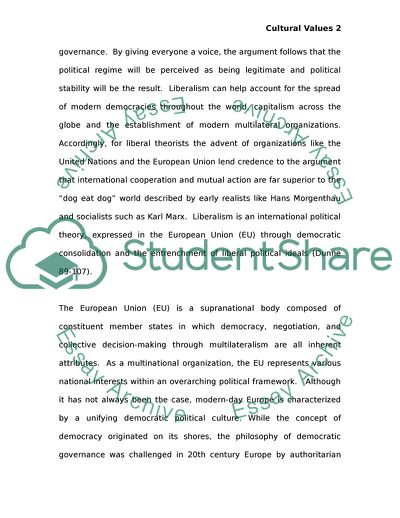
- Home
- Free Samples
- Premium Essays
- Editing Services
- Extra Tools
- Essay Writing Help
- About Us
- Studentshare
- Subjects
- Miscellaneous
- Reflect on a significant cultural value
Reflect on a significant cultural value - Essay Example

- Subject: Miscellaneous
- Type: Essay
- Level: Undergraduate
- Pages: 4 (1000 words)
- Downloads: 0
- Author: lindmelvin
Extract of sample "Reflect on a significant cultural value"
As an important cultural value found in the developed countries of the Western world including the United States, Canada, Australia and the European Union, this analysis will explore the cultural attributes of liberal democratic rule. Liberal democracy is characterized by free and fair elections, universal suffrage and an open society in which political power is transferred through peaceful means. Political stability in much of the world is defined as the establishment of democracy and democratic rules of governance.
By giving everyone a voice, the argument follows that the political regime will be perceived as being legitimate and political stability will be the result. Liberalism can help account for the spread of modern democracies throughout the world, capitalism across the globe and the establishment of modern multilateral organizations. Accordingly, for liberal theorists the advent of organizations like the United Nations and the European Union lend credence to the argument that international cooperation and mutual action are far superior to the “dog eat dog” world described by early realists like Hans Morgenthau and socialists such as Karl Marx.
Liberalism is an international political theory, expressed in the European Union (EU) through democratic consolidation and the entrenchment of liberal political ideals (Dunne 89-107). The European Union (EU) is a supranational body composed of constituent member states in which democracy, negotiation, and collective decision-making through multilateralism are all inherent attributes. As a multinational organization, the EU represents various national interests within an overarching political framework.
Although it has not always been the case, modern-day Europe is characterized by a unifying democratic political culture. While the concept of democracy
...Download file to see next pages Read More
- TERMS & CONDITIONS
- PRIVACY POLICY
- COOKIES POLICY